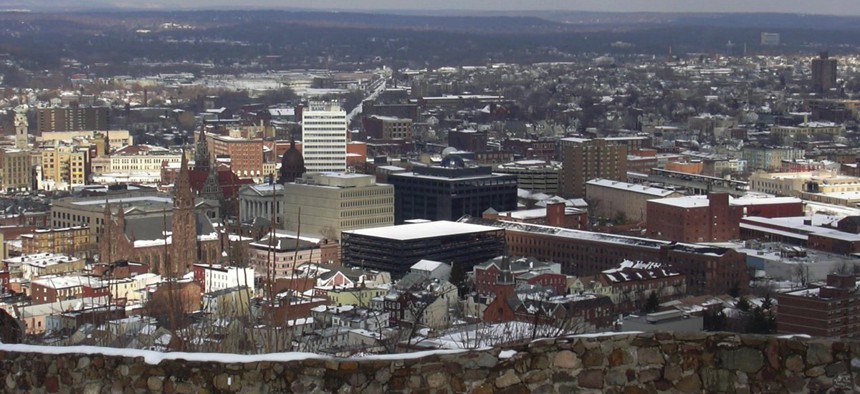Temporary Budget Patch Ends Partial Government Shutdown in N.J. City

Paterson, New Jersey Po Shan Cheah / Shutterstock

Connecting state and local government leaders
Paterson, New Jersey suspended many basic services on Tuesday, including trash pick-ups and after school programs.
A partial government shutdown in Paterson, New Jersey ended late Tuesday night, according to the city.
Many municipal services there had been suspended at the start of the day, amid wrangling over the city’s budget between Mayor Jose "Joey" Torres and the City Council. Paterson is New Jersey’s third most populous city.
During an emergency council meeting on Tuesday night, members initially rejected budget proposals the mayor had put forward but, as midnight approached, they approved a temporary funding measure that will enable the government to resume normal operations on Wednesday, the Paterson Press reported.
Of the city’s 1,651 employees, 1,196 who are considered "non-essential" were affected by Tuesday's shutdown, according to an announcement the mayor's office issued Monday.
Among the suspended services were curbside garbage pick-ups, after school programs, senior citizen initiatives, crossing guards and street cleaning.
Roughly 450 city staff members were authorized to continue working. These employees included uniformed police and firefighters, the city’s tax collector, clerk and health officer, Office of Emergency Management staff and those working at Paterson’s municipal court. Some Department of Public Works employees were also deemed essential and allowed to show up for work.
“I am authorized to expend funds on behalf of the current City budget until midnight today,” Torres had said in a statement on Monday.
Paterson is already about two-thirds of the way through its 2016 fiscal year, but has operated with a series of monthly interim budgets, according to information from the mayor’s office.
The long delay finalizing a spending plan, Torres’ office says, is partly because the city did not find out until Feb. 26 how much money it would receive from the state in transitional aid.
New Jersey's government distributes this type of aid to municipalities in the state that are facing financial problems.
Torres' administration presented the City Council with amendments to the mayor's initial 2016 budget plan on Feb. 23. These called for reducing the proposed amount of general spending to $275 million from $283 million. The council rejected the amendments.
Even with the lower level of spending, the budget plan would still involve a 6.1 percent property tax increase and relying on an infusion of $25 million in transitional aid.
Council members opposed to Torres' proposals have balked at the level of the tax increase and pushed for budget cuts.
But the mayor's office says the state will not fork over the $25 million in aid unless taxes are raised by 6.1 percent, and also noted on Tuesday that "much of the money in the proposed budget has already been spent via the interim budgets."
For the 2015 fiscal year, Paterson was awarded $25 million of transitional aid, according to the New Jersey Department of Community Affairs. In an October 2014 letter outlining the city’s need for those funds, Torres cited an annual $7.6 million budget deficit.
Moody’s Investors Service on Feb. 18 revised the credit outlook for Paterson’s general obligation debt to negative.
“The negative underlying outlook reflects our expectation that city operations will be significantly pressured over the next 12 to 18 month[s] by the lack of budget consensus for fiscal 2016,” Moody’s noted.
The ratings agency rates the city’s general obligation debt Ba1, meaning it is a speculative investment, subject to substantial credit risk.
Some of the factors behind that rating, according to Moody’s, are weak prospects for Paterson’s budget balance and cash reserves this year, an above average debt burden, a declining tax base, below average income levels in the city, and high unemployment and poverty rates.
Paterson had an estimated population of 146,753 residents in 2014. Median household income there between 2010 and 2014 was $33,964, according to the U.S. Census Bureau. The state median during that time was $72,062.
This story was updated around 1 a.m. on Wednesday to include information about the outcome of the emergency City Council meeting held in Paterson, New Jersey.
Bill Lucia is a Reporter for Government Executive’s Route Fifty.

NEXT STORY: Employment Rates Creep Closer to Pre-Recession Levels





